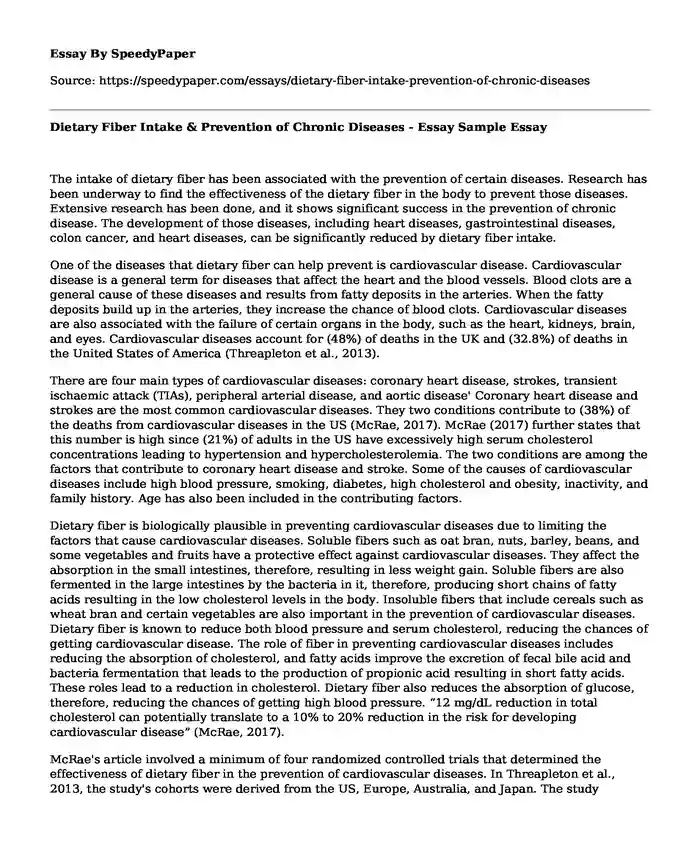The intake of dietary fiber has been associated with the prevention of certain diseases. Research has been underway to find the effectiveness of the dietary fiber in the body to prevent those diseases. Extensive research has been done, and it shows significant success in the prevention of chronic disease. The development of those diseases, including heart diseases, gastrointestinal diseases, colon cancer, and heart diseases, can be significantly reduced by dietary fiber intake.
One of the diseases that dietary fiber can help prevent is cardiovascular disease. Cardiovascular disease is a general term for diseases that affect the heart and the blood vessels. Blood clots are a general cause of these diseases and results from fatty deposits in the arteries. When the fatty deposits build up in the arteries, they increase the chance of blood clots. Cardiovascular diseases are also associated with the failure of certain organs in the body, such as the heart, kidneys, brain, and eyes. Cardiovascular diseases account for (48%) of deaths in the UK and (32.8%) of deaths in the United States of America (Threapleton et al., 2013).
There are four main types of cardiovascular diseases: coronary heart disease, strokes, transient ischaemic attack (TIAs), peripheral arterial disease, and aortic disease' Coronary heart disease and strokes are the most common cardiovascular diseases. They two conditions contribute to (38%) of the deaths from cardiovascular diseases in the US (McRae, 2017). McRae (2017) further states that this number is high since (21%) of adults in the US have excessively high serum cholesterol concentrations leading to hypertension and hypercholesterolemia. The two conditions are among the factors that contribute to coronary heart disease and stroke. Some of the causes of cardiovascular diseases include high blood pressure, smoking, diabetes, high cholesterol and obesity, inactivity, and family history. Age has also been included in the contributing factors.
Dietary fiber is biologically plausible in preventing cardiovascular diseases due to limiting the factors that cause cardiovascular diseases. Soluble fibers such as oat bran, nuts, barley, beans, and some vegetables and fruits have a protective effect against cardiovascular diseases. They affect the absorption in the small intestines, therefore, resulting in less weight gain. Soluble fibers are also fermented in the large intestines by the bacteria in it, therefore, producing short chains of fatty acids resulting in the low cholesterol levels in the body. Insoluble fibers that include cereals such as wheat bran and certain vegetables are also important in the prevention of cardiovascular diseases. Dietary fiber is known to reduce both blood pressure and serum cholesterol, reducing the chances of getting cardiovascular disease. The role of fiber in preventing cardiovascular diseases includes reducing the absorption of cholesterol, and fatty acids improve the excretion of fecal bile acid and bacteria fermentation that leads to the production of propionic acid resulting in short fatty acids. These roles lead to a reduction in cholesterol. Dietary fiber also reduces the absorption of glucose, therefore, reducing the chances of getting high blood pressure. “12 mg/dL reduction in total cholesterol can potentially translate to a 10% to 20% reduction in the risk for developing cardiovascular disease” (McRae, 2017).
McRae's article involved a minimum of four randomized controlled trials that determined the effectiveness of dietary fiber in the prevention of cardiovascular diseases. In Threapleton et al., 2013, the study's cohorts were derived from the US, Europe, Australia, and Japan. The study included a dietary assessment in determining the effectiveness of the dietary fiber.
The role of dietary fiber is evident in the prevention of cardiovascular diseases. It has roles that inhibit the accumulation of cholesterol and reduce the blood pressure that result in a reduction in the chances of getting cardiovascular diseases. An increase in the consumption of soluble and insoluble fiber has a protective effect against cardiovascular diseases.
References
Threapleton, D. E., Greenwood, D. C., Evans, C. E., Cleghorn, C. L., Nykjaer, C., Woodhead, C., Cade, J. E., Gale, C. P., & Burley, V. J. (2013). Dietary fiber intake and risk of cardiovascular disease: systematic review and meta-analysis. BMJ,347, f6879. https://doi.org/10.1136/bmj.f6879
McRae M. P. (2017). Dietary Fiber Is Beneficial for the Prevention of Cardiovascular Disease: An Umbrella Review of Meta-analyses. Journal of Chiropractic Medicine, 16(4), 289–299. https://doi.org/10.1016/j.jcm.2017.05.005
Cite this page
Dietary Fiber Intake & Prevention of Chronic Diseases - Essay Sample. (2023, Oct 29). Retrieved from https://speedypaper.net/essays/dietary-fiber-intake-prevention-of-chronic-diseases
Request Removal
If you are the original author of this essay and no longer wish to have it published on the SpeedyPaper website, please click below to request its removal:
- Free Essay: Chapter 3 Methodology of the Oral Delivery of Therapeutic Proteins and Peptides Research
- Social networking sites
- Free Essay Sample about National Health Status
- Transgender Identity Issue in Healthcare Setting, Essay Sample at No Charge
- Research Notebook
- Essay on Covid-19: A Devastating Turn in America's States
- Mythological Life in the Time of COVID - Essay Sample
Popular categories





